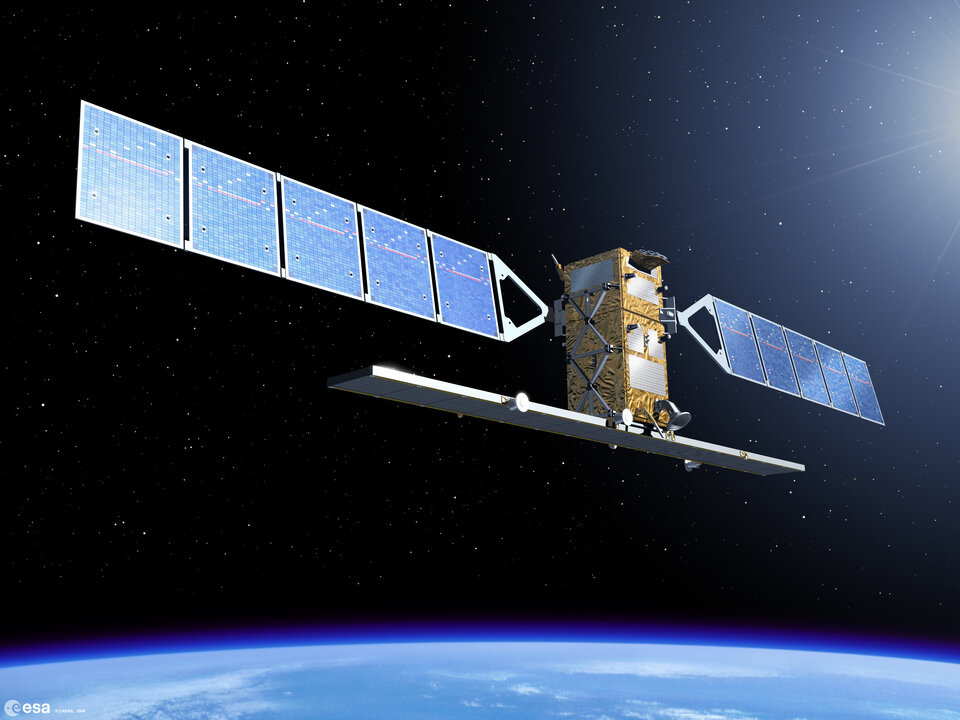Conference highlights deepening connection between space and security
Space experts met this week in Madrid to advance cooperation in GMES and Space Situational Awareness, programmes that are crucial for securing Europe's future. The event brought together policy makers from several organisations, including ESA Member States, the European Community and the European Defence Agency.
The 'Conference on Space and Security', 10–11 March, highlights the contributions that will be made to Europe's future by the Global Monitoring for Environment & Security (GMES) programme and ESA's Space Situational Awareness (SSA) Preparatory Programme.
While GMES and SSA are separate activities, both will help guarantee the availability of economically vital services delivered from space, such as navigation, telecommunication, meteorological, scientific and environmental services, by providing timely and accurate information on the Earth/space environment and on man-made and natural threats.
The Madrid event is part of the continuing 'Structured Dialogue' on space called for by the European Space Policy (ESP), and was hosted by the Spanish government to coincide with the current Spanish presidency of the EU Council.
The Structured Dialogue on space and security is bringing together the relevant European Commission (EC) services, the Secretariat-General of the Council including the European Satellite Centre (EUSC), the European Defence Agency (EDA) and ESA, and is an increasingly effective instrument for exploiting inter-institutional synergies.
Securing Europe's future

Under the leadership of the EC, GMES was established to fulfil the growing need among European policymakers to access accurate and timely information to manage the environment better, understand and mitigate the effects of climate change and ensure civil security. Since the initiative relies largely on Earth observation data, ESA, in accordance with the ESP, is responsible for developing and implementing the 'Space Component', including five families of Sentinel missions.
While ESA is responsible for the GMES Space Component, which includes the new Sentinels, coordinating other satellite missions contributing to GMES and the associated ground segment infrastructure, the European Commission, acting on behalf of the EU, is responsible for the overall initiative, setting requirements and managing the services.
Although protecting the environment from the effects of climate change is one of the main drivers for GMES, border surveillance, maritime surveillance and support to EU External Action have also been identified as priority areas for action.
"Today, within GMES, we have a very strong focus on the important aspects of environmental monitoring services. But space-based security services will play an increasingly important role and both services are crucial for GMES. The security services have even higher technical requirements in some areas," said Volker Liebig, ESA's Director for Earth Observation Programmes.
Protecting vital space assets
Started in January 2009, the ESA SSA Preparatory Programme serves the strategic aims of the ESP by supporting the independent capacity to operate Europe's critical space infrastructure securely and safely in a sustainable manner. SSA aims to help protect European space systems and ground infrastructure against space debris, harmful space weather and potential impacts. By using federated European assets, SSA precursor services are being readied for launch, including space weather monitoring and space debris analysis.

SSA encompasses three major segments: Space Surveillance & Tracking, Space Weather and Near-Earth Objects. The Preparatory Phase includes designing the overall structure, defining the data & governance policy, establishing data centres and management systems and, in parallel, launching precursor services based on existing European assets. SSA is also developing a test prototype of a European space surveillance radar.
"Largely, Europe continues to rely on non-European sources for information and data on the space environment and debris avoidance. This situation places European space infrastructure at risk. It is clear that SSA is an urgently needed programme. It will only proceed, however, with international partnerships and with a robust governance policy agreed by European stakeholders," said Gaele Winters, ESA's Director of Operations and Infrastructure.
Conference delivers latest information
The conference programme included technical briefings on the current status of GMES and SSA, an overview of existing European infrastructure that could contribute to either activity, SSA customer requirements and usage scenarios, sessions and panel discussions on governance, data security and defence considerations for dual programmes.

Conference participants heard that the notion of 'security' is subject to many interpretations.
Europe faces new threats that are more diverse and less predictable than seen in the past. Space is today playing an increasingly critical role in security and the first important steps have been taken in developing security related aspects of European space projects, such as GMES, SSA and Galileo, increasing synergies between civil and military space activities and programmes. However, the precise requirements of the users of security-related data, generated by programmes like GMES and SSA, must still be identified before adequate global services can be regularly provided.
The Conference on Space and Security was organised by Spain's Centre for the Development of Industrial Technology (CDTI) on behalf of the government of Spain.









